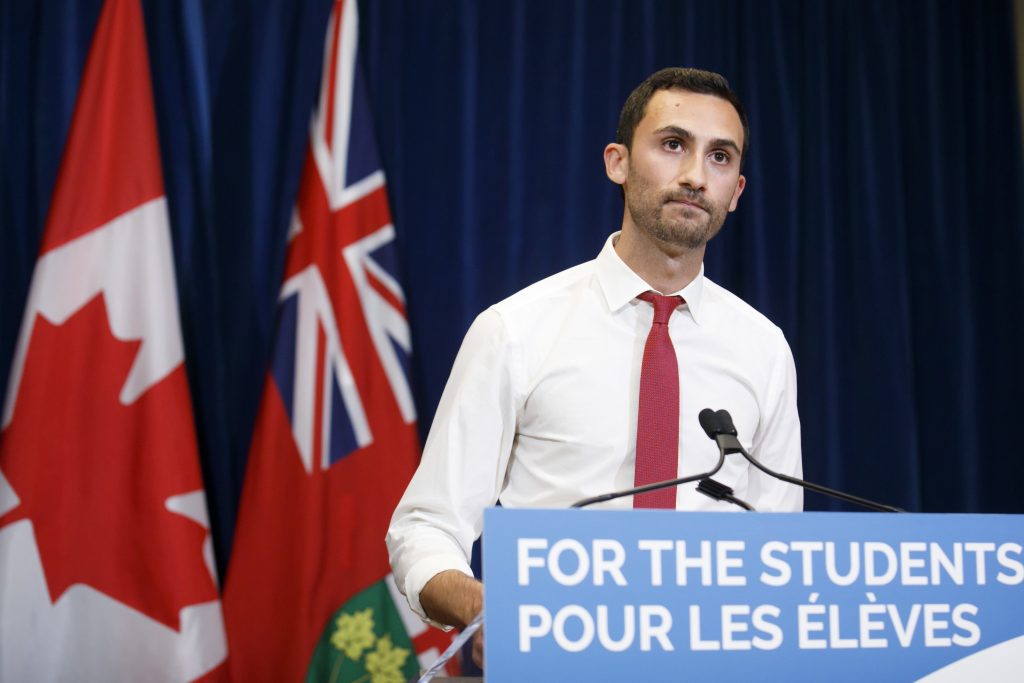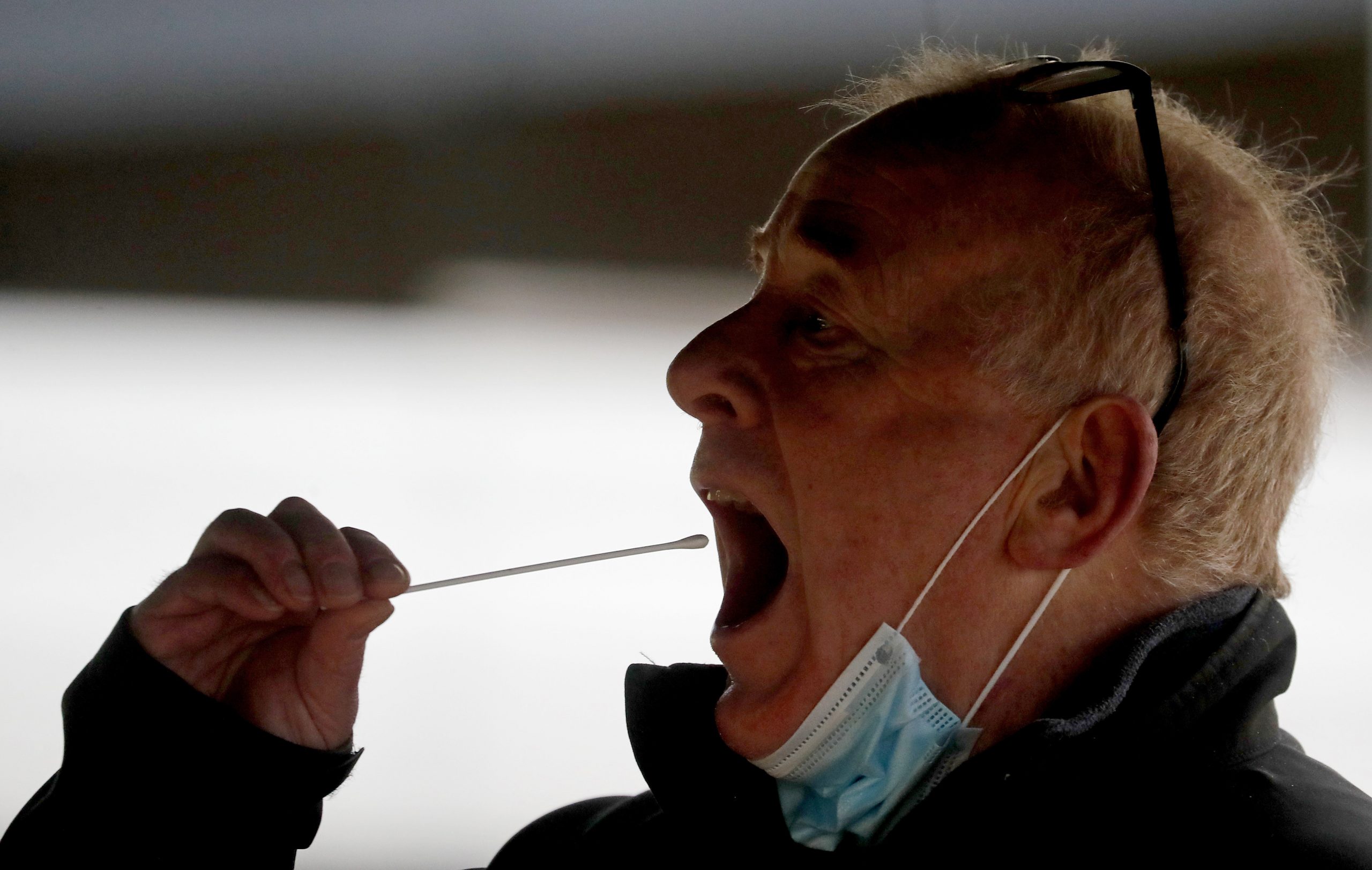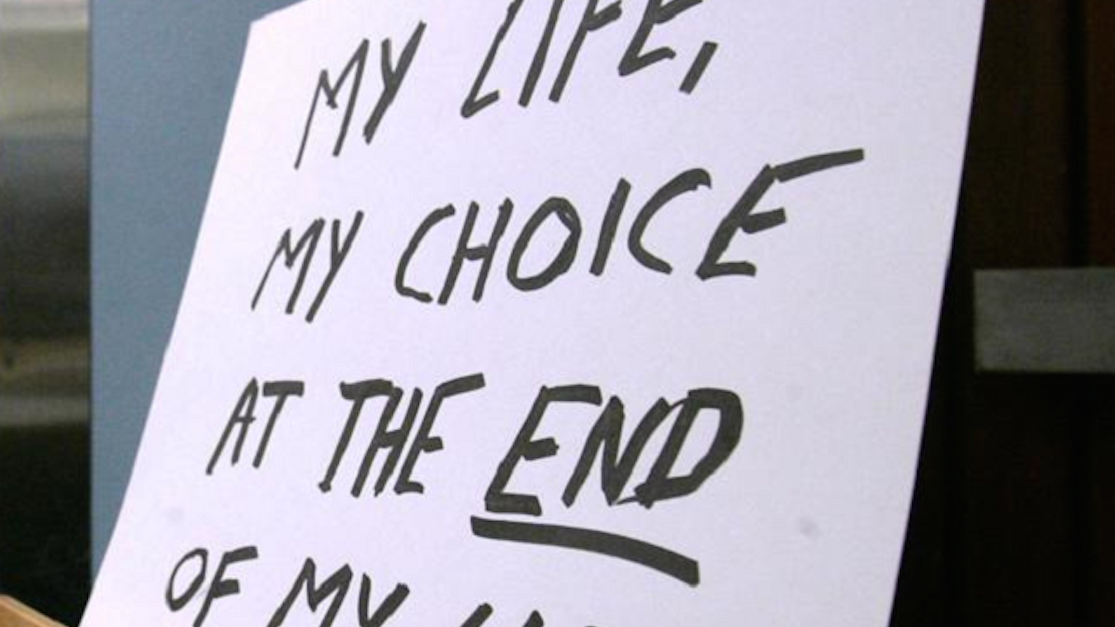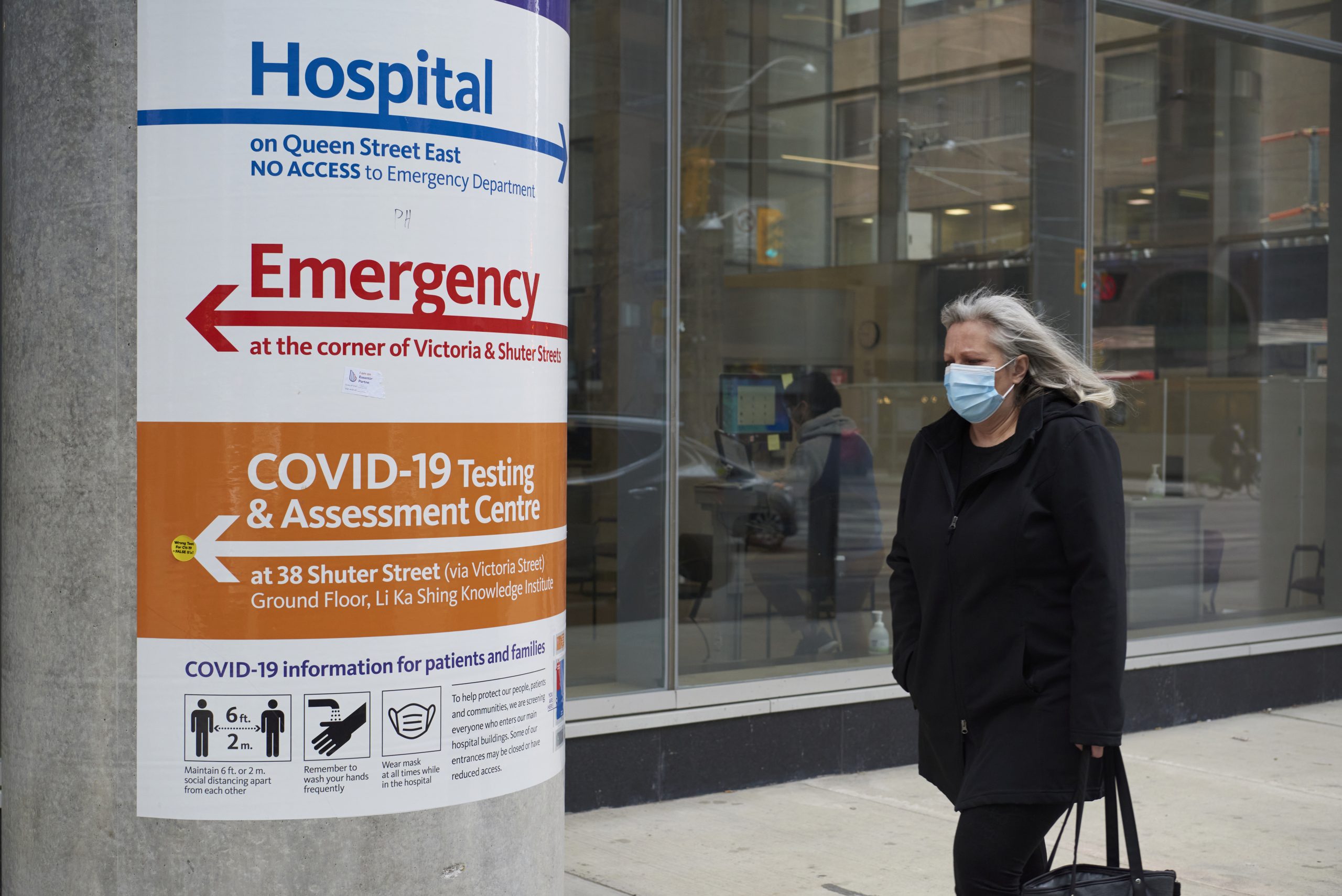Toronto Public Health has confirmed the first cases of the Brazilian and South African variant of the COVID-19 virus in the city.
Officials said on Sunday that a patient who had recently travelled from Brazil has tested positive for the P.1 COVID-19 mutation. They are currently hospitalized.
This also marks the first confirmed case of the Brazilian variant in the province of Ontario.
Health officials also reported the first confirmed case of the B.1.351 mutation, known as the South African variant of the virus. This person has no recent travel history and has had no known contact with anyone who has recently traveled.
Toronto Public Health says there are currently 27 confirmed cases of the COVID-19 variant in the city.
As of Sunday, the province had counted 176 confirmed cases of the variant from the U.K., and one of the variant from South Africa, not including Toronto’s new case.
A single-day snapshot from January found that the variant from the U.K. accounted for 5.5 per cent of all positive COVID-19 cases in the province, and that percentage is expected to rise quickly.
As of last week, the province has been screening all positive cases to see if they can be tied to one of the variants.
Most of the variant cases are in the Simcoe Muskoka District Health Unit, where an outbreak ripped through a Barrie nursing home killing more than half of the residents and an essential caregiver.
Public health officials around the world have raised concerns about new virus variants that are more contagious or resistant to existing vaccines. While viruses mutate constantly, most of the changes cause little concern. But scientists are closely tracking these mutations to make sure they quickly identify variants of concern.
Public health officials are also concerned because the variant first discovered in South Africa contains a mutation of the virus’ characteristic spike protein targeted by existing vaccines. The mutation may mean the vaccines offer less protection against the variant.
The developers of AstraZeneca’s coronavirus vaccine say the shot appears to work against the variant detected in Britain late last year which is similar to previously reported results by other vaccine manufacturers, including Pfizer and Moderna. Researchers are studying the potential effectiveness of the vaccine against the South Africa variant.
Files from The Associated Press and The Canadian Press were used in this report

Tom Brady made his seventh Super Bowl title look familiar – despite moving south to a new team and conference during a pandemic.
Brady threw two touchdown passes to old friend Rob Gronkowski and one to good pal Antonio Brown, and the Tampa Bay Buccaneers beat Patrick Mahomes and Kansas City 31-9 on their home field in Super Bowl 55 on Sunday.
The GOAT (Greatest of all-time) extended his Super Bowl titles’ record in his 10th appearance, his first without Patriots coach Bill Belichick. The 43-year-old Brady broke his own mark for oldest player to win a Super Bowl and joins Hall of Famer Peyton Manning as the only quarterbacks to win one with multiple franchises.
“I’m not making any comparisons,” Brady said. “Experiencing it with this group of guys is amazing.”
Brady was also named the MVP of the game for the fifth time in his career. That moves him past LeBron James and leaves him one behind only Michael Jordan’s 6 for most championship series/game MVP awards won by a player in North American major pro team sports history.
I’m so proud of all these guys. We had a rough November but we came together at the right time. We knew this was gonna happen. We played our best game of the year – Tom Brady
The Buccaneers (15-5) won their second NFL title and first in 18 years while becoming the first team to play the big game at home, capping an unusual and challenging season played through the novel coronavirus. They won three road games as a wild-card team to reach the Super Bowl.
Tampa’s victory prevented Mahomes and the Chiefs (16-3) from becoming the first repeat champions since Brady’s Patriots did it in 2003-04.
Bruce Arians became the oldest coach at age 68 to win the Super Bowl. His mom, 95-year-old Kay Arians, witnessed it in person. Brady, Gronk and defensive co-ordinator Todd Bowles helped Arians get that Vince Lombardi Trophy.
Bowles devised a masterful plan to frustrate Mahomes and shut down the Chiefs, the complete opposite of Kansas City’s 27-24 win in Tampa in Week 12, when the Chiefs jumped to a 17-0 lead in the first quarter. Tyreek Hill had 269 yards receiving and three TDs in that one. He was held to 73 yards on seven catches.
The NFL completed its 269-game season on time without any cancellations, a remarkable accomplishment that required nearly 1 million COVID-19 tests for players and team personnel.
Due to the virus, only 25,000 mask-wearing fans were allowed in, including approximately 7,500 vaccinated health care workers who were given free tickets by the NFL. About 30,000 cardboard cutouts made the stadium look full.
The game also featured a halftime performance by Scarborough-born R&B superstar The Weeknd. The Grammy-winning singer performed a medley of his hits, including “Can’t Feel My Face,” “Earned It” and his most recent chart topper, “Blinding Lights.”
https://toronto.citynews.ca/2021/02/07/brady-leads-bucs-to-convincing-win-over-chiefs-in-super-bowl-lv/

Ontario is considering cancelling March break in an effort to curb the spread of COVID-19.
Speaking on Breakfast Television this morning, Education Minister Stephen Lecce says he hopes to have a decision by next week.
“I’m going to follow the public health advice on this. I’ve sought the opinion of the Chief Medical Officer of Health and if he believes – and the experts believe – it is better to keep kids in school learning, then I will accept that advice,” said Lecce. “At the end of the day folks should not be travelling during March break anyway.”
https://toronto.citynews.ca/2021/02/04/ford-government-considers-cancelling-march-break-to-curb-covid-spread/
News of the potential spring break cancellation comes a day after Lecce released plans to reopen those schools still closed in the coming weeks.
Schools in Toronto, Peel and York are to reopen on Feb. 16, while those in other public health units where in-person classes haven’t resumed reopen Feb. 8.
Lecce said he will base the March break decision entirely on “public health imperatives.”
But the unions representing the province’s elementary, secondary and Catholic school teachers said mental health should also be considered.
“We are living in unprecedented times that continue to create high levels of stress, fear and anxiety for everyone,” said Sam Hammond, president of the Elementary Teachers’ Federation of Ontario. “We have heard repeatedly that students, families and educators need a break right now.”
He said travel-related concerns should be dealt with in other ways.
Harvey Bischof, president of the Ontario Secondary School Teachers’ Federation, believes the minister is just trying to gauge public opinion.
“I fully believe he’s just floating political trial balloons and he truly doesn’t care about the medical advice he gets,” Bischof tells 680 NEWS. “The idea of reducing gatherings, for example, by cancelling March break flies in the face of logic.”
In addition to the mental health concerns, there are some logistical issues at play said Bischof.
Many local collective agreements have a requirement for the number of school days in a year, he said, so if March break is cancelled and no days off are offered in lieu, it could lead to problems.
The government could remedy that by starting the summer break early, which Bischof noted is well within the ministry’s rights.
Jennifer Harris Bialczyk, a Toronto mother of two, says she can see it both ways.
She went from celebrating Lecce’s school reopening announcement with friends over Zoom – “we all had wine,” she said – to wondering whether she’d have to cancel plans to visit her cottage over the spring break.
“I can see it both ways,” she said. “I understand that the cases will likely go up if there is a March break. But I also think the kids, the parents, and the teachers all need a break.”
She said the last month of balancing online learning and her own work has left her exhausted, so she was looking forward to some time off.
NDP education critic Marit Stiles said Lecce’s comments teasing an announcement on March Break’s potential cancellation are unfair to parents and educators who need time to prepare.
“They’re just stringing everyone along, trying to build up some anticipation, but the problem is that it leaves people frustrated, scared,” she said. “Real people have real lives and they need to plan.”
Stiles said students, parents and teachers need the break because weeks of online learning has been stressful for all involved.
“I don’t know what planet (the government) has been on, but this has not been a break for parents, or kids or on staff,” she said. “It has been extraordinarily hard work.”
The federal government has instituted its own policies aimed at preventing travel over the spring break, announcing last week that four major airlines would halt flights from Canada to Mexico and the Caribbean until the end of April.
The provincial government has also introduced mandatory COVID-19 testing for all international arrivals to Ontario, and Ottawa has a similar program ramping up in the coming weeks.

Pet groomers across Ontario can reopen to provide certain services, the province said Thursday as it clarified its pandemic regulations surrounding animal care.
Solicitor General Sylvia Jones’ office said groomers can reopen to provide services necessary to prevent “foreseeable and reasonably imminent” veterinary care.
Groomers can also provide services if an order has been issued to a pet owner under the province’s animal welfare act.
The services must be by appointment-only, through curbside pickup, and groomers are only permitted to take one animal at a time.
Lindsay Buccella, a pet groomer in Stouffville, Ont., said Thursday’s announcement was welcome, although she added that the government needed to specify what type of care might be necessary to prevent a vet visit.
“Every groom is for the welfare of an animal and if they don’t get groomed on a regular basis, they could end up at the vet,” she said.
“This is good news but if they’re going to put these restrictions, they need to specify what they consider an emergency.”
Buccella said she already had clients booked for nail trimming appointments after the government updated its rules. Long dog nails, she noted, can cause permanent skeletal damage if not trimmed.
Pet grooming businesses were ordered closed when a provincial lockdown took effect in late December.
The province had said, however, that pet grooming was allowed when required for an animal’s health and said a vet could provide those services.
Some cities said that the province’s rules led to confusion for businesses and pet owners.
Earlier this week, the Greater Toronto and Hamilton-area mayors and chairs asked the government to clarify the rules.
Mississauga, Ont., Mayor Bonnie Crombie had said her city would not issue fines or take other enforcement action against pet grooming businesses that operate using a curbside pickup system. She had called on the province to amend the rules to clearly permit the services.
Pet groomers had said their businesses help keep animals healthy and noted that vets may not be able to take animals for grooming-related needs because of limited capacity during lockdown.
The Ontario Veterinary Medical Association said some vet clinics have longer wait times for appointments due to a backlog of cases from earlier in the pandemic and COVID-19 safety protocols.

Canadian Heritage Minister Steven Guilbeault is promising legislation this year to ensure tech giants like Google and Facebook pay for the news content they disseminate on their platforms.
The promise comes as newspapers across the country are displaying blank front pages in a bid to highlight the “urgent” need for news media companies to be paid for their work.
News Media Canada, which represents newspaper publishers, organized the campaign; it saw some 105 daily and community newspapers across the country displaying blank front pages Thursday, with more to follow Friday.
The organization argues that Canadian news media companies are going under and journalism jobs are disappearing because their content is being used for free by Google and Facebook, which are simultaneously hoovering up 80 per cent of all digital advertising revenue.
It warns that as the producers of real news disappear, “hate and fake news” will be all that’s left.
In a statement, Guilbeault says his department is studying options for a made-in-Canada formula for ensuring publishers are fairly compensated for the news they produce; his goal is to introduce legislation on the matter this year.
“News is not free and has never been,” he said in the statement Thursday.
“Our position is clear: publishers must be adequately compensated for their work and we will support them as they deliver essential information for the benefit of our democracy and the health and well-being of our communities.”
While the tech giants have played a positive role in making news accessible, Guilbeault said, “we must address the market imbalance between news media organizations and those who benefit from their work.”
He added that the government is looking closely at how other countries are handling the issue, specifically France and Australia.
As far as News Media Canada is concerned, Australia has found the right solution: mandatory arbitration if digital companies fail to reach an agreement with news publishers on how much they should be paid.
“These massive American companies get virtually all of the revenue and don’t pay for content,” says the organization’s president, John Hinds, in an open letter to members of Parliament.
“Movie content doesn’t work that way in Canada. Music content doesn’t work that way. TV show content doesn’t work that way. So why is news content treated differently?”
Google and Facebook have threatened to shut down their services in Australia if the mandatory arbitration policy is implemented. However, Guilbeault has suggested such boycotts will become untenable as more countries follow Australia’s lead.
The minister is expected sometime this winter to introduce legislation to regulate the dissemination of hate speech, child pornography, non-consensual sexual images, terrorism and incitements to violence on social media.
His office says legislation dealing with fair compensation for news content will be introduced separately.

A snapshot of COVID-19 variants on a single day in January suggests levels of the more contagious strains in Ontario are low but that’s expected to change quickly, public health officials said Thursday.
A Public Health Ontario study of COVID-19 cases on a single day in January found variants in 5.5 per cent of cases screened, with the majority linked to a long-term care home outbreak.
Dr. Vanessa Allen, the agency’s top microbiologist, said the results highlight how quickly variants of COVID-19 can spread in an outbreak.
While the data suggests low prevalence, variants are expected to spread rapidly, she said.
“Essentially, doubling is expected approximately every one to two weeks,” Allen said.
Public Health Ontario started screening all positive COVID-19 samples for variants on Wednesday, Allen said.
“Data in the coming days will be helpful to understand how this is evolving in the Ontario context,” she said.
So far, Ontario has recorded 152 cases of the variant that first emerged in the U.K. and one case of another that first emerged in South Africa.
A third variant that first emerged in Brazil has not yet been detected in Ontario.
The variants are believed to be more infectious and health officials have said they might also cause more severe illness.
The province’s medical officer of health, Dr. David Williams, said residents must continue following public health practices like masking and physical distancing to guard against further spread of variants.
“What we said before was important for COVID-19 writ large, now for the variant is even more important – to be vigilant in what you’re doing, be careful and cautious,” Williams said.
In its study, Public Health Ontario screened 1,880 positive COVID-19 samples from Jan. 20 and found variants in 103 cases.
The agency said 89 of those cases were in the Simcoe-Muskoka health unit, where a deadly outbreak at the Roberta Place nursing home in Barrie, Ont., was linked to the variant.
Sixty-six residents at Roberta Place had died from the virus as of Thursday. The outbreak has infected more than 200 people, including staff and close contacts.
Outside of outbreaks, the Public Health Ontario study found 1.2 per cent of the total samples were variant cases.
More results from the study are expected in the coming days, the agency said.
The variant that emerged in the U.K. was first detected in Ontario in December and has since been found in 11 public health units.
In Simcoe-Muskoka, the local health unit reported that 91 cases of the U.K. variant had been confirmed in the region as of Thursday, with 60 other likely cases that were awaiting test results.
The unit also reported 85 deaths from COVID-19 in the month of January, “over four times higher” than deaths reported in December 2020.
Ontario reported 1,563 new cases of COVID-19 and 88 more deaths linked to the virus on Thursday.
Public health officials have noted, however, that updates to a provincial database are causing data fluctuations in this week’s case counts.

The National Women’s Hockey League called off the remainder of its season Wednesday on the eve of the playoffs because of additional positive test results for COVID-19.
The NWHL cited safety concerns for what it called the suspension of play inside a quarantined bubble in Lake Placid, New York. COVID-19 instead wreaked havoc on the two-week event.
Two of the league’s six teams had already withdrawn from the tournament, with the Metropolitan Riveters citing “several” virus cases. The league did not confirm the Connecticut Whale’s departure was illness-related and said only it accepted their decision to forfeit a game and withdraw.
The Riveters’ departure last Thursday led the NWHL to postpone all games that day with play resuming Saturday. Coach Ivo Mocek said at the time: “Our team is heartbroken to not have the chance to compete for the Isobel Cup, but we are aligned with the league in prioritizing the well-being of all of the players and staff.”
The NWHL had an agreement with Yale University to provide saliva-based COVID-19 testing for players and staff, similar to what the NBA used for its Disney World bubble last year. Even that testing couldn’t keep the virus out.
The expansion Toronto Six finished with the league’s best record at 4-1-1.
“We don’t have many words right now but what we do know is that we couldn’t be more thankful for all of the support we’ve received over the last 10 months,” the Six tweeted. “From launch on April 22nd to our first ever puck drop. We can’t thank you all enough.
“We will be back.”
Two semifinal games Thursday and and the final Friday were set to be televised nationally in the U.S. on NBC Sports Network, putting women’s hockey in a prominent spotlight a year away from the Beijing Olympics.
The end of the NWHL bubble experiment came on the same day the rival Professional Women’s Hockey Players Association announced it will play a game at New York City’s Madison Square Garden on Feb. 28. The PWHPA is made up of 125 of the sport’s biggest stars, including those on the U.S. and Canadian national teams, who banded together in the hopes of forcing the creation of a new pro league.
The game at MSG comes 13 months after PWHPA players took part in NHL All-Star Weekend. It will be the first professional women’s hockey game at the storied arena.
“This is a major milestone for women’s hockey and young girls who aspire to play professional hockey but don’t have the option to make it a career today,” said Hockey Hall of Famer Jayna Hefford, an operations consultant for the PWHPA.
The NHL’s New York Rangers are hosting the women’s game with the team playing at Buffalo that day. Rangers president John Davidson said the team is “excited to play even a small role in helping elevate visibility for the women’s game.”
“The talent level of women’s hockey is simply incredible,” Davidson said. “We all love this sport so much and any opportunity the Rangers have to participate in its advancement is something we want to be a part of. It’s a win for everyone involved.”
The game in New York is set to be the first stop on the second “Dream Gap Tour,” with others around the U.S. and Canada to be determined. The announcement was made on National Girls and Women in Sports Day.
“Investing in and advancing women’s hockey strengthens the game overall and creates a range of professional opportunities for women as coaches, front office executives and athletes,” said Mary-Kay Messier, Bauer Hockey vice-president of global marketing and an adviser to the PHWPA.

A bill to expand access to medical assistance in dying has emerged intact from a Senate committee but it’s not likely to remain unscathed for long.
The Senate’s legal and constitutional affairs committee accepted the bill Wednesday in a matter of minutes, without amendment.
But it did so only because members agreed in advance to hold off proposing amendments until the legislation returns next week to the Senate for final debate.
And several senators made it clear they fully intend to propose amendments when the time comes.
“We can debate this at length at third reading, we can do amendments at third reading,” said Sen. Don Plett, leader of the Conservative Senate caucus.
“As I don’t think it is any secret, I am inherently opposed to the entire piece of legislation … There are a few of us. I’m not alone.”
Indeed, it has become clear during the committee’s extensive hearings on the bill that many senators have profound objections – some, like Plett, because they think it goes too far and others because they think it doesn’t go far enough.
Committee members essentially agreed to shelve their concerns for now, in the interests of getting the bill back to the Senate as a whole quickly.
The government wants the legislation passed by Feb. 26 – the thrice-extended, court-imposed deadline for complying with a 2019 Quebec Superior Court ruling which struck down a provision that allows assisted dying only for those who are nearing the natural end of their lives.
That deadline could still be in jeopardy if, as seems likely, the Senate makes substantial amendments to the bill. The amended version would have to go back to the House of Commons to decide whether to accept or reject the amendments before shipping it back to the Senate, where senators would have to decide whether to approve the bill even if some or all of their amendments were rejected.
In theory, the bill could bounce repeatedly back and forth between chambers.
The bill would scrap the near-death proviso but retain the concept to create two eligibility tracks for an assisted death: a relaxed set of rules for people who are at the end of life and more stringent rules for those who are not.
It would also explicitly prohibit the procedure for people suffering solely from mental illnesses.
Some senators and constitutional experts believe that exclusion contravenes the Charter of Rights and Freedoms, which guarantees equal treatment under the law, regardless of physical or mental disability.
Other senators and disability rights advocates argue the bill is unconstitutional because it sends the message that the lives of people with disabilities are not of equal value.
One amendment that will almost certainly be proposed would call on the government to refer the bill to the Supreme Court of Canada for authoritative advice on its constitutionality.
Among other likely amendments:
– A sunset clause on the mental illness exclusion, giving the government a year to come up with guidelines for allowing assisted dying for people suffering solely from mental disorders.
– A clause specifying that discussion of medical assistance in dying must be triggered by the patient, not by medical practitioners.
– A clause to strengthen the conscience rights of medical practitioners, likely specifying that those who have moral or religious objections to assisted dying do not have to refer a patient to someone who will provide the procedure.
– Various amendments to restore some of the eligibility criteria relaxed in Bill C-7 for people who are near death.
– Various amendments to remove some of the more stringent eligibility conditions imposed on people who are not near death.

All Air Canada Rouge flights will be paused beginning Monday.
The airline is citing new restrictions brought in by the Canadian government that effectively ban flights to sunny destinations like the Caribbean and Mexico in the midst of the COVID-19 pandemic.
Roughly 80 employees have been handed temporary layoffs.
This isn’t the first interruption for Rouge service. Flights were suspended for most of last year but restarted in November ahead of the winter travel season.
Air Canada says Rouge remains a part of its long-term business plan.
Last week, Prime Minister Justin Trudeau announced that Air Canada, WestJet, Sunwing, and Air Transat would suspend service to Caribbean destinations and Mexico between January 31, and April 30.
“With the challenges we currently face with COVID-19, both here at home and abroad, we all agree that now is just not the time to be flying,” Trudeau said last Friday.
“By putting in place these tough measures now, we can look forward to a better time when we can all plan those vacations.”
With files from the Canadian Press
https://toronto.citynews.ca/2021/02/03/ontario-schools-reopening-plan-covid19/
Students in COVID-19 hotspots – Toronto, Peel and York regions – will return to in-class learning on Tuesday, February 16, Education Minister Stephen Lecce announced on Wednesday.
The following public health units outside of the Greater Toronto Area will head back to class on February 8:
- Brant County Health Unit
- Chatham-Kent Public Health
- Durham Region Health Department
- Haldimand-Norfolk Health Unit
- Halton Region Public Health
- City of Hamilton Public Health Services
- Huron Perth Public Health
- Lambton Public Health
- Niagara Region Public Health
- Simcoe-Muskoka District Health Unit
- Region of Waterloo Public Health and Emergency Services
- Wellington-Dufferin-Guelph Public Health
- Windsor-Essex County Health Unit
“Following the best medical advice, with the clear support of both Ontario’s and the local Medical Officers of Health, we are reopening schools across the province knowing that we have taken additional steps and made additional investments to better protect our students and staff,” said Lecce.
“Nothing is more important than returning kids to school safely because it is crucial for their development, mental health, and future success.”
http://https://www.facebook.com/watch/?v=1715060242006682
Lecce said the government wouldn’t hesitate to alter plans if COVID-19 cases begin surging again, adding individual public health units also have the authority to close schools based on local circumstances.
“I want to be clear, if things change … we will not hesitate to act … that’s why we’re gong to monitor the trends to ensure we deliver on our number one priority for our government – keeping schools safe.”
“As kids return to schools, schools will be even safer,” Lecce added, noting the implementation of enhanced screening and testing, as well as mandatory masks for student in Grade One and up.
All students in Ontario began January with online learning as part of a provincial lockdown.
Toronto’s mayor and its officials say they fully support the Ford government’s careful review and subsequent decision to allow kids back for in-person learning.
John Tory and Toronto’s top doctor, Dr. Eileen de Villa, both acknowledged that while any decision made will come with both positive and negative reaction, they say students are better suited inside classrooms.
“I am in full support of the approach taken by premier [Doug] Ford and minister [Stephen] Lecce, including the approach taken with respect to City of Toronto schools, in particular. In-class learning is very important. Kids need the social development they get from going to school while being surrounded by teachers and their peers. We all agree as well that this reopening of schools must happen safely.”
Dr. de Villa, meanwhile, says that on the subject of reopening these schools, she is “of the belief, there is no perfect answer or solution during a pandemic.”
“When schools were closed for months in the first part of the pandemic, it was in large part for the same reason almost everything else was closed, too. We knew very little about COVID-19 – how it is spread, who is vulnerable to it, how it could be treated, and even if vaccines were possible. Over the past year, the body of knowledge has expanded.”
Ontario’s largest teachers’ union said Wednesday that adequate safety measures must be in place to prevent future school closures.
The president of the Elementary Teachers’ Federation of Ontario said the government must take “urgent action” to fund additional measures and provide time for school boards to implement them.
“The Ford government has not invested any new provincial money since August,” Sam Hammond said. “They must stop taking credit for federal funding and invest now to avoid contributing to a third wave.”
NDP education critic Marit Stiles said while the Opposition want to sees schools reopen, the government has not demonstrated how it will make them safe.
The province needs to cap class sizes at 15 students, create a comprehensive in-school testing regime, and improve ventilation, she said.
“Don’t just open schools – make them safe to open,” Stiles said.
Romana Siddiqui, a mother of three living in Mississauga, Ont., said it’s some comfort for her that Peel Region is resuming classes a week later than others, allowing more time for cases to decline further.
She said, however, that she’d still like to see more safety measures, such as smaller class sizes.
“We know for our kids, being in a brick-and-mortar school in person, that’s the best in terms of the quality of their education,” Siddiqui said, adding that it’s a difficult call to weigh the benefits of in-person learning with the risks of virus transmission in schools.
“There’s always a push-and-pull. There’s no easy answers.”
Shameela Shakeel, who has three school-aged children, said she wants assurance that the government’s “enhanced safety measures” will be in place by the time classes resume in York Region in two weeks.
“They have to really start to seriously mean it when they say that safety comes first for our kids and educators,” the Newmarket, Ont., parent said.
The decision on schools came as Ontario reported 1,172 new cases of COVID-19 on Wednesday, although officials noted that updates to the provincial case-management system were causing data fluctuations.

















